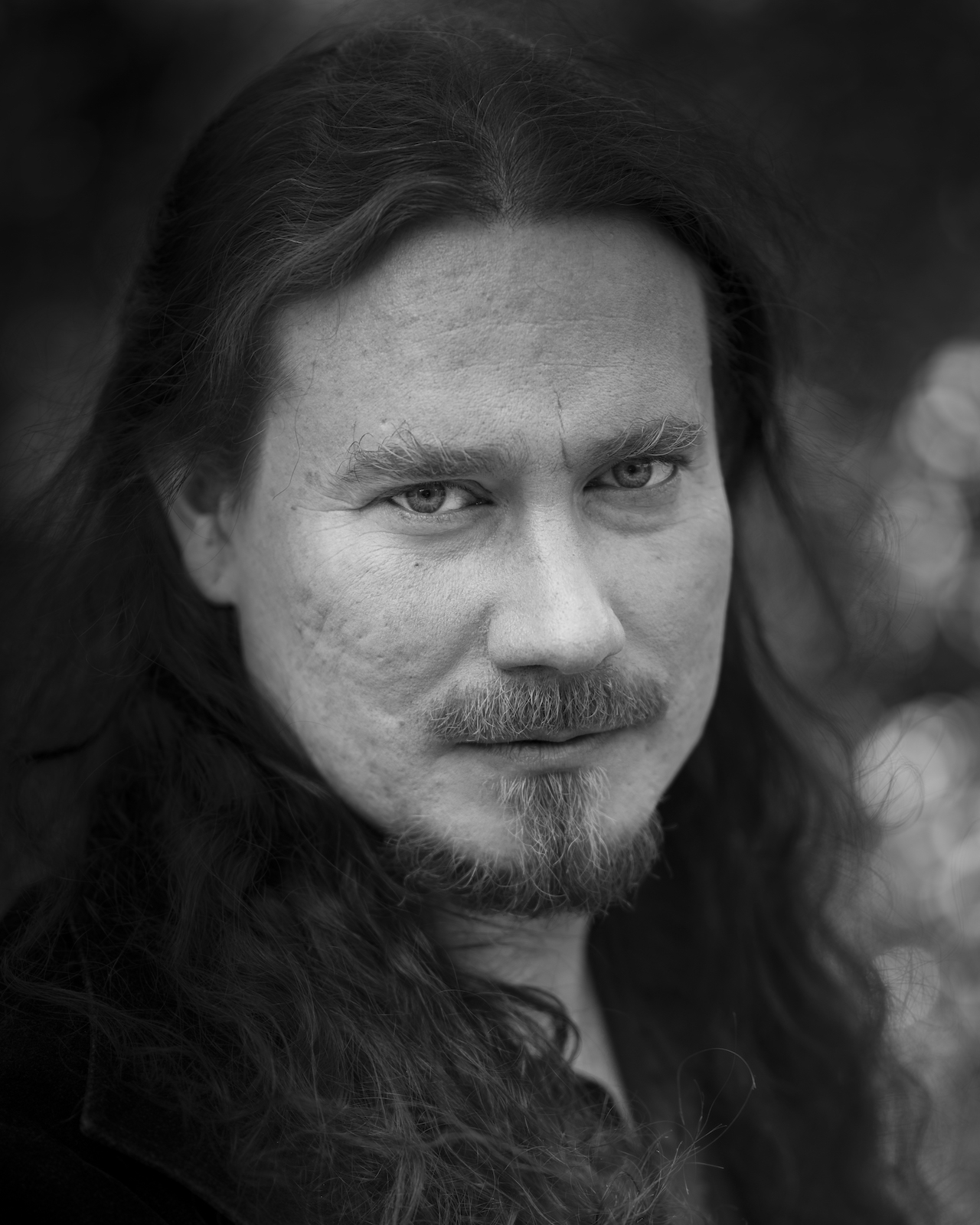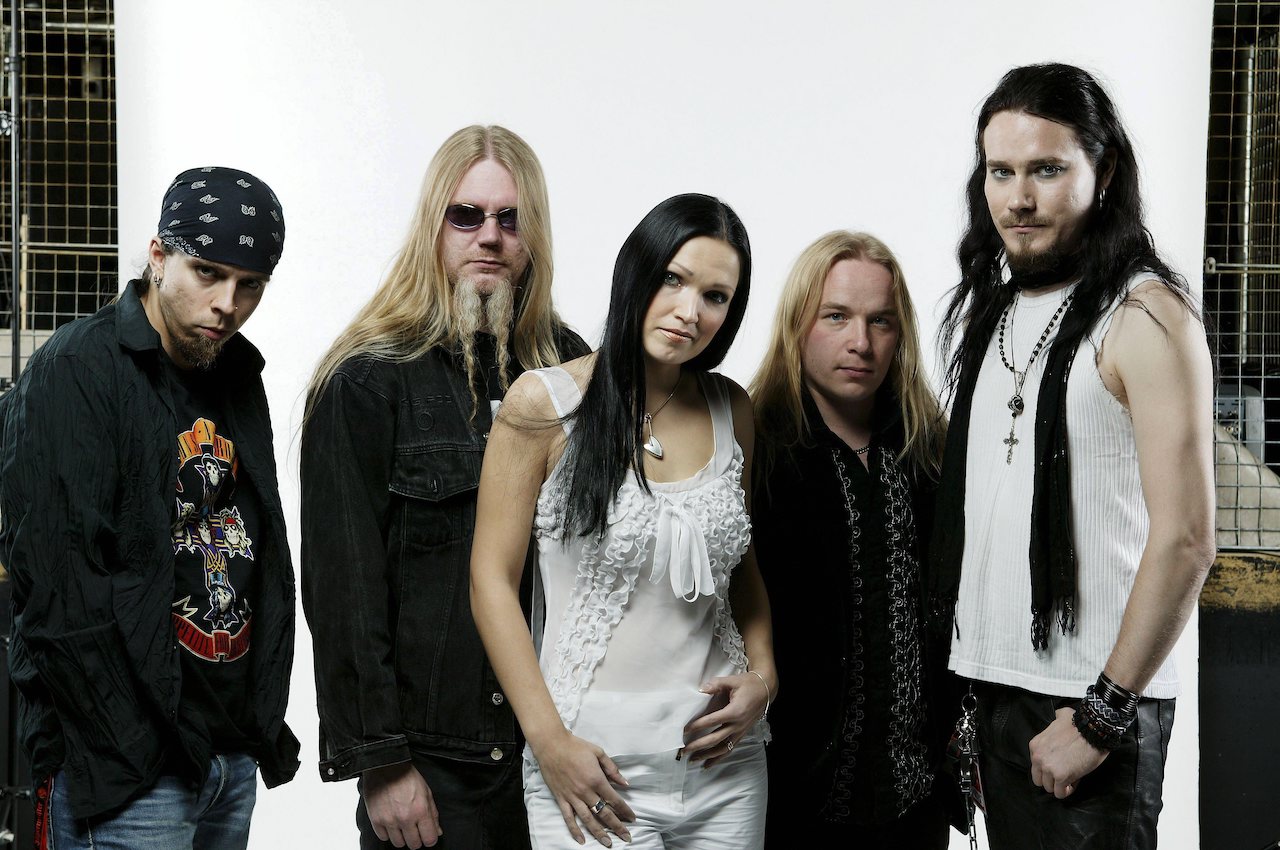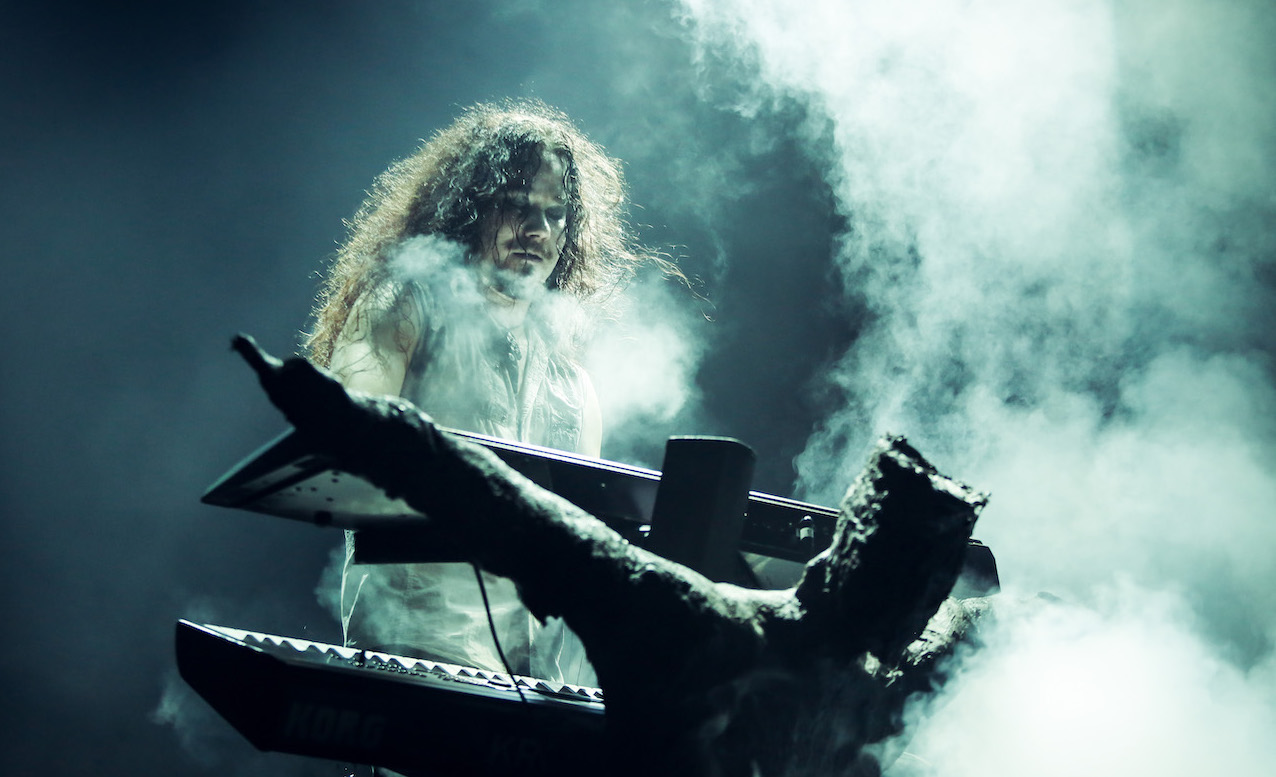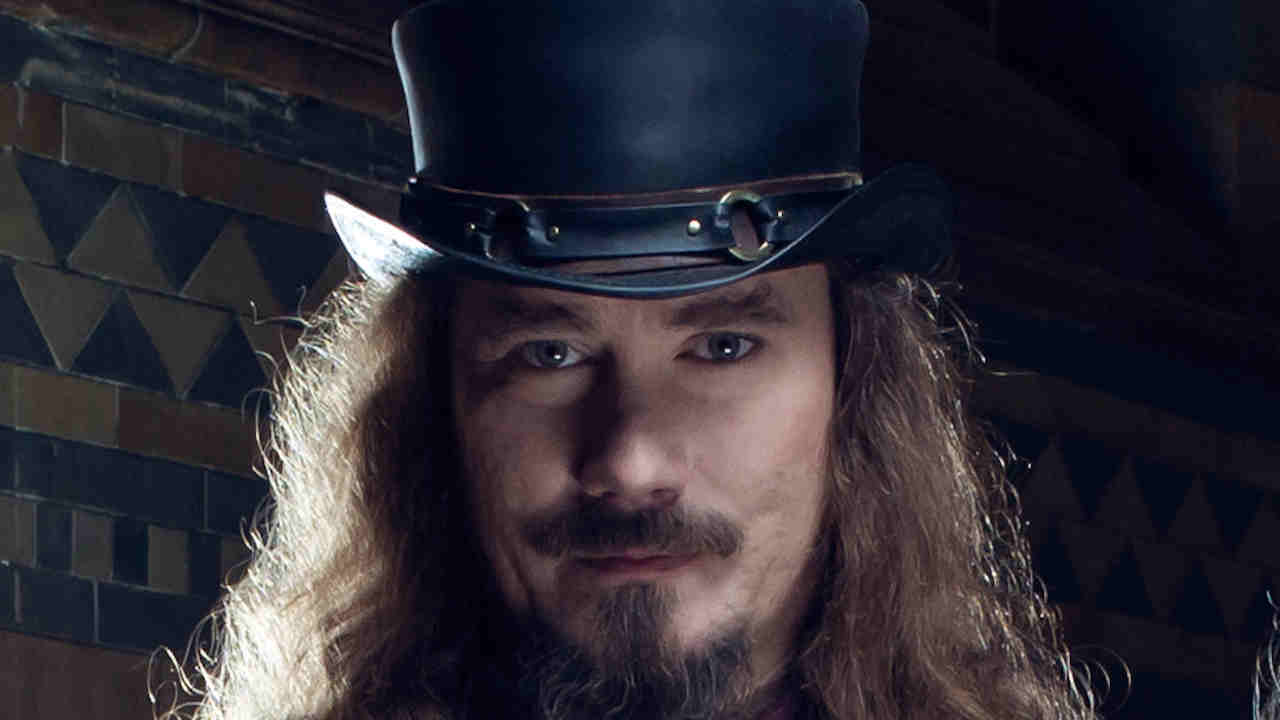Kitee is the moonshine capital of Finland. For years, the hooch industry was this rural backwater’s most famous export. “Say Kitee to any Finnish person, and the first thing they think of is moonshine”, says Nightwish’s keyboard player and mastermind Tuomas Holopainen, a lifelong resident of the town. A look of disgust crosses his face. “I hate the stuff. It’s absolutely horrible.”
He can savour the fact that his band have overtaken nuclear-strength grog as the biggest thing to have emerged from Kitee in the last two decades. What started out as an acoustic project dreamed up around a campfire in the woods in the mid-90s has become a symphonic metal juggernaut and the most successful Finnish band ever.
There has been turbulence along the way – most notably the acrimonious firing of original singer Tarja Turunen in 2005. They hit another bump at the start of 2021 when linchpin bassist and co-vocalist Marko Hietala announced his departure. “I was totally devastated for a few days”, says Tuomas of the latter. “I was almost completely sure that this was the end of the band.”
Clearly, it wasn’t. Not only have Nightwish recruited touring replacement Jukka Koskinen, but Tuomas has been working on material for the follow-up to 2020’s Human. :||: Nature..
“Nightwish is not some dream come true for me”, he insists of the 25-year journey that has brought him here. “I wanted to be a marine biologist. I wanted to be the Indiana Jones of the seas...”

What were you like as a kid?
“Very introverted. I enjoyed being by myself. I was full-on into Walt Disney comics, fantasy board games, The Lord Of The Rings, all that. I had adventures in the nearby forests with my imaginary friends Huey, Dewey, Louie and Frodo Baggins. Was I a nerd? Yeah. And that still describes me pretty well.”
Were there any musicians in your family?
“My mother is a piano teacher, so that’s where I got it from. She put me into piano lessons when I was six, and then I started playing the clarinet when I was seven.”
What was the band that made you want to be a musician?
“I stayed in America in 1992 as an exchange student, and my host family took me to see Metallica and Guns N’ Roses in Kansas City in a huge football stadium. I wasn’t into heavy metal at all, but they had bought me the ticket so I went. And Metallica blew my mind. It was a turning point for me. The next week I bought all the Metallica cassettes that I could find. From then, I was completely hooked for life.”
The story goes that you conceived Nightwish around a campfire in the woods. Did that really happen?
“It happened just like that. I was spending a night at my parents’ cabin at this little island with the guys from a high school band I was in called Dismal Silence. While we were barbecuing sausages and having a few drinks, I told the other guys that I wanted to form a band because I wanted to write my own songs. I said it will be completely acoustic campfire music, and they said, ‘Yeah, go for it.’ And then a week later I joined the army.”
Did you enjoy being in the army? Did they teach you how to kill an enemy soldier with a spoon?
“Ha, no. I absolutely detested it, but it’s mandatory in Finland that all the males go to the army. You can stay there for six or nine months, or go to the civil service, which takes at least 12 months. I decided to take the short path and try my luck entering the military band. You had to do all the shit with the guns and all that for eight weeks, but luckily I spent the next seven months playing about 300 shows and marches with the band.”
Do you ever wonder what would have happened if they’d have sent you to a war zone?
“I would have lost my mind because I can’t handle guns. I hate them more than anything. I believe in self- defence, so I’m not a pacifist in that sense. I’m just very anti-gun, except for sport and hunting. I can’t understand the laws in the US, for where you can actually buy a gun without a background check for self-defence. It’s just so absurd.”

Finland doesn’t have a great track record for producing world-famous bands. Did that make you determined to be successful?
“No, that was never the ambition. I read about [famed undersea explorer] Jacques Cousteau when I was six, and I wanted to be a marine biologist. Even during the formation of Nightwish, I was studying to become an environmental scientist. That lasted about five months before I quit my studies, moved back to live with my parents and borrowed money from my dad to buy a new keyboard. But there was never a big ambition in Nightwish: ‘We have to sell this many records... we have to sell out Wembley Arena.’”
You sang on a few tracks on the first Nightwish album. With respect, you’re not the greatest singer. Did anyone tell you at the time that it might not be the best idea?
“Yeah, I did. When I wrote those parts for a male voice, I was hoping that we could ask somebody like Timo Kotipelto from Stratovarius or maybe Jukka [Nevalainen, original Nightwish drummer], because he used to sing in a school choir, but none of them agreed to do it. So I just had to do it in the end. When I listen to it now, it sounds quite innocent, but it taught me a lesson.”
When Nightwish were starting out, you worked as a teacher. Did the kids know you were an aspiring rock star?
“I was completely broke, so I got this job as a stand-in teacher in the local high school. I was there for about two years. My main job was to take care of a girl in a wheelchair – I’d take her to class, take her to eat, all that. But whenever teachers got sick, they would call and say, ‘Can you replace me for a day?’ I have absolutely no qualifications for that, but they gave me notes, so it would be OK. It’s funny meeting those students, ’cos they’re 35, 40 years old now.”
You came close to splitting the band and quitting music early on, after you fired your original bassist, Sami Vänskä. Do you ever wonder what your life would be like if you had gone through with that?
“I would have gone back to university and continued with my studies as a biologist. I really would have – that was what I was going to do. But I was on a hike with my friend Tony [Kakko, Sonata Arctica singer], and he said, ‘If you quit now, you will regret it for the rest of your life.’ He also told us that we needed to hire a manager, because myself and Jukka were managing the band. That was awful, booking shows and taking care of contracts without anyone watching our backs. So we hired a manager who we could trust, and that made all the difference.”
2004’s Once was the album that took you to another level. What was it like being in Nightwish at that point?
“It was one of the best eras of the band. We were at the right place at the right time. The metal scene in Finland was rising massively: Him, The Rasmus, Lordi, all these were becoming really big. We were riding that wave, but also we made our strongest album by then. We spent a lot of money, but I remember being really confident that it wouldn’t fail. Like, ‘Wow, this might be something big.’”
And then you fired Tarja Turunen after Once. Did you think, ‘This is it, the band is over’?
“Funnily enough, no. I’ve had that feeling twice. The first time was in 2001, after we fired our first bass player, and the second was when Marko left. But when Tarja left, and when Anette [Olzon, Tarja’s replacement] left, I never felt, ‘OK, this is the end.’ On the contrary. The persistence was there: ‘We need to get over this and show the world.’”
There’s a perception that you can be a ruthless bastard when it comes to getting rid of bandmembers. Is that fair?
“No, no. There is a reason why things happen, and when you take things to an extreme, you just snap. Like Red said to Andy Dufresne in The Shawshank Redemption, ‘Every man has his breaking point.’ You can just imagine how difficult things had to have been for us to deal with things the way we did. And, of course, it should have been dealt with so much better, but I forgive myself and the other bandmembers for dealing with it the way we did because of the state that we were in.”
Have you spoken to Tarja since she left?
“We have emailed a few times. Even though the wounds are still there on both sides, things are better.”
Have you actually spoken to her?
“No. Just emails. A few months ago, my father passed away and she immediately sent me an email with her condolences. I was very touched by that.”

You have talked about being “in a dark place” after Tarja left. What was happening?
“After the split, the next few months were really, really dark. The things that really saved me from doing anything silly were my family, my close friends and the film The Village by M. Night Shyamalan. I watched it twice a day for weeks. That film made all the difference. Just the idea of this community living in peace in the middle of the wood, secluded from the world. Plus it has the best soundtrack ever written. It just filled me with comfort and hope.”
When you say those things, “doing something silly”, what do you mean?
“I was never suicidal, it wasn’t even close, but I was in a really dark place. It was the worst period of my life. Call it depression, but not suicidal. I want to make that clear.”
Does the responsibility of being at the centre of Nightwish ever get stressful?
“Yeah, it can be. There’s a very common misconception that people have of me, that I’m a tyrant and I want to take care of everything. I’m the opposite of a control freak. If you ask the other bandmembers, I think they would agree that I try to be as invisible a band leader as possible. I make the final decisions when it comes to important matters, but I don’t want to make an issue out of it.”
Nightwish never seemed to have been a sex, drugs and rock’n’roll band. Is that something you’ve steered away from, or have you just kept it quiet?
“There was a period, maybe 15 to 20 years ago, when I was maybe drinking too much. There was the rock’n’roll lifestyle for a few years. But never drugs. I’ve never tried those.”
What’s the most rock’n’roll thing you’ve ever done?
“I trashed a backstage once, because it just had to be done. A bucket-list thing. But that was when the troubles with Tarja were happening, so the frustration just came out. I felt so ashamed afterwards.”
We lost your fellow Finn, Alexi Laiho, at the end of 2020. Did you know him well?
“Yeah, we were really close about 10 or 15 years ago. We hung out a lot. I went to his place, he came to my place in Kitee. We shared a love of music, and also Donald Duck and board games – innocent, child-like things. The past few years we weren’t in contact so much. We’d send SMS and call each two or three times a year, but that’s it. No reason really, we just didn’t see each other much.”
Did his death hit you hard?
“Yeah, pretty hard. We knew he was going through some troubles with his physical health, but when I got the phone call, I remember falling on my knees – like, ‘No way.’ It punched me big time. I really miss him. He was a wonderful personality. There was an innocence in him, a naivety when it came to music that I really respected.”
Speaking of innocence, what do you miss most about Nightwish’s early days?
“It all being new and wonderful. After doing this for this long, you’re bound to get a little bit jaded about doing another American or European tour for six weeks. I don’t mind at all, but the initial excitement is not there anymore, it’s not the same as it was in 1999 when we toured for the first time. To get that excitement back in would be something special.”

Have you ever seen a photo of yourself back in the day and thought, “What the hell was I wearing?”
“Oh yeah. I used to wear white tennis socks with red stripes on them and pants that were too short, so you could see these ridiculous socks. I used to have these Rasta extensions in my hair, really poor make-up that I did myself. But I look back on those images and laugh. I’m not embarrassed at all.”
What are the benefits of being a member of Finland’s most successful band? Does it get you the best seats in all the restaurants?
“Ha ha ha! No, I’m not really into publicity. I still haven’t got used to people recognising me. People do recognise me, but they don’t stop me – that’s not the Finnish mentality. But when you go to a bar, you don’t usually have to buy the drinks.”
Does Nightwish make you happy all the time?
“Not all the time. There have been bad times, but when you look at the big picture, it does make me happy. When it stops giving more than it takes, then we have to call it quits.”
You said in 2019 that if another bandmember leaves, it’s the end of Nightwish. And now Marko’s gone...
“That’s how I felt back in 2019, and that’s also how I felt when Marko left. I take my words back when it comes to that. But if it would be Floor [Jansen, vocalist] leaving, that’s it, it’s the end of Nightwish. Absolutely, 100%.”
If Nightwish did end tomorrow, how would you feel about it?
“If Nightwish ends, it was a great run, a wonderful adventure of 25 years. Then I’d just have to come up with something else.”
Published in Metal Hammer #351.

